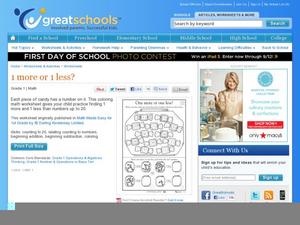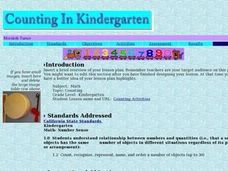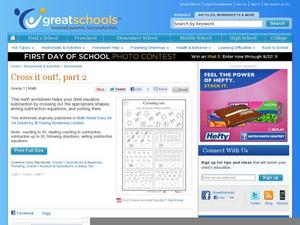Illustrative Mathematics
Sort and Count II
Capture the engagement of young mathematicians with this hands-on sorting activity. Given a bag of objects, students work independently sorting the items based on their physical attributes, counting to determine the size of each group....
Houghton Mifflin Harcourt
Unit 4 Math Vocabulary Cards (Grade 1)
Support math vocabulary using a set of 25 flashcards. The set consists of a variety of bold-faced word cards and corresponding labeled picture cards. Terms include even numbers, regrouping, skip counting, and more.
Montana Office of Public Instruction
Native American Culture: Counting, 1:1 Correspondence
Kindergarteners practice showing 1:1 correspondence while incorporating information they learned about a local Native American culture. The objects used for counting are taken from the previous day's Native American lesson. The intention...
Curated OER
One More or One Less?
Hook new mathematicians with a candy-themed approach to addition and subtraction. They examine 10 numbers (not exceeding 19) printed on candy wrappers. For each, learners calculate and record numbers with values one more and one...
PBS
Button, Button
Youngsters count, classify, and estimate quantities using buttons after a read aloud of The Button Box by Margarette S. Reid. They discuss the difference between guessing and estimating. Based on an experiment, they predict the...
Curated OER
Counting in Kindergarten: Make Number Books
Emergent math masters practice 1:1 correspondence, number recognition, and quantity-to-number relationships. They view number flashcards, state the correct number name, and circle the corresponding numeral to represent the number of...
Curated OER
Counting: Connecting Pictures and Numbers
As young scholars begin connecting numbers with values, help them grasp this concept with sets of objects like these. They examine five sets (up to 15 in number) and match each to a corresponding digit. Then, they draw a set of their own...
Curated OER
We're Counting At The Zoo!
Budding mathematicians use sets of concrete materials to represent, count, and match quantities to 10 or more given in verbal or written form while participating in hands-on activities. This instructional activity uses the book 1,...
Primary National Strategy
Ordering and Counting
Are you in need of a 5-day unit intended to teach little learners how to count to 20? This is a well-structured complete set of lessons which employ a variety of methods to instruct learners about various ways to count from 1 to 20. They...
Curated OER
Number Value Assessment
Quiz your second graders with this set of math worksheets involving place value, word problems, number sequence, greater than/less than, coin value, expanded form, and much more! Most have multiple choice answers provided, and generally...
Curated OER
Finding 10s
For beginners to addition, sets of objects are the ideal way to make this concept understandable. For each of these sets they ring 10 and count the remaining. Then, scholars fill in the addends as 10 and the remaining number. The sums...
Curated OER
More Than or Less Than?
How many apples is less than five? Each of these problems has two images, one with quantifiable details and one without (i.e. a tree with apples and an empty tree). Answers will vary as young counters draw objects onto the second image...
Curated OER
Subtracting
Help kids visualize subtraction by assigning these sets of objects for them to subtract. They examine an example before completing the seven equations on their own. For each, learners cross out the subtrahend value and count the...
Curated OER
Reading Numbers
Teach number value to 20 through sets of objects. Young pupils use the number given for each of the four sets to determine how many should be colored in. How many are left? There is an addition box that has been left blank so scholars...
Curated OER
Sets Of
Represent multiplication as sets of items for beginners to this concept. They look at six familiar object sets and determine the total number of legs by counting the sets. There is some scaffolding here, as the first is done for them and...
DK Publishing
Addition: Count and Color, part 2
Introduce young counters to addition through coloring as they examine number sentences represented by sets of objects. Learners count the two addends and color in the sum by counting out the total in a final set. There is an example, and...
DK Publishing
Addition: Count and Color, part 3
Approach addition with sets of objects to show scholars the operation visually. There are four sets of images here arranged as addends in an addition number sentence. Learners count them and color in the total in a final set. All answers...
Curated OER
Study Buddies: Counting Back Tens and Ones
In this math worksheet, students will work with a coach to solve a problem in which they must subtract by counting back by tens and ones. Students will follow a step-by-step process and notes are provided for the coach.
Curated OER
M&M Counting Fun
Students count up to 10 or more M & Ms using verbal names and one-to-one correspondence, as well as use sets of M & Ms to represent quantities given in verbal form.
Curated OER
Crossing Out
By crossing out objects young mathematicians can begin comprehending subtraction concepts. They examine six sets, each including two types of shapes. Learners choose one shape to cross out, filling in the subtraction equation this way...
Curated OER
Multiplication as Repeated Addition
For beginners, present multiplication as repeated addition to give them a familiar context. They examine grouped sets of objects and add up the groups to get a total. Then, learners translate the addition sets to a basic multiplication...
Curated OER
Most and Least
Which one has the most? Each row has three sets of identical objects, and scholars compare the sets to determine which has the most or the least (they find the most for the first four and the least for the last four). One example is...
Curated OER
Count by Grouping Into Tens
In this counting by grouping activity, learners group shapes into tens by circling either groups of 5 or ten in ech. A reference website for additional resources is given.
Curated OER
How Many More on a Graph?
First graders identify a number that is one more or one less than a number up to one hundred and identify a mystery number. They also create a class graph that illustrates how many children are in each family, and answer questions about...























